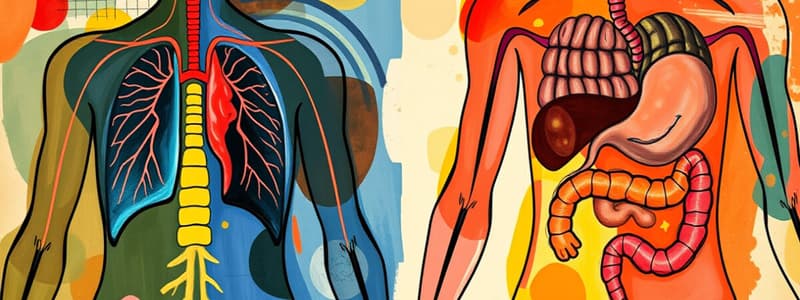Podcast
Questions and Answers
What is the primary function of an Information System?
What is the primary function of an Information System?
- To process and analyze information to improve operations (correct)
- To solely collect and store data
- To provide a platform for social interaction
- To manage hardware within an organization
Which of the following components is NOT typically part of an Information System?
Which of the following components is NOT typically part of an Information System?
- Processes
- People
- Data
- Environmental conditions (correct)
How do subsystems within an Information System interact with each other?
How do subsystems within an Information System interact with each other?
- They compete for resources
- They transfer outputs to other subsystems (correct)
- They operate independently without exchanging information
- They only function during specific time intervals
In what form can an Information System exist?
In what form can an Information System exist?
What purpose does an Information System serve in decision-making?
What purpose does an Information System serve in decision-making?
What is the primary purpose of the Input Function in an Information System?
What is the primary purpose of the Input Function in an Information System?
Which of the following describes a function of an Information System?
Which of the following describes a function of an Information System?
Which function in an Information System is responsible for retaining and retrieving data?
Which function in an Information System is responsible for retaining and retrieving data?
What role does communication play for a Librarian in an Information System?
What role does communication play for a Librarian in an Information System?
What characteristic defines useful information in an Information System?
What characteristic defines useful information in an Information System?
Flashcards are hidden until you start studying
Study Notes
Human Body Overview
- Various systems in the human body, such as Respiratory, Skeletal, Muscular, Digestive, and Nervous systems work as subsystems.
- These subsystems fulfill specific goals and transfer their outputs to other systems.
Information System Definition
- An Information System (IS) is a collection of components that collaborates to provide essential information for managing organizational operations.
- It involves people, data, processes, presentation of information, and IT, supporting daily operations and decision-making.
Functions of Information Systems
- Input Function: Accepts external data into the system.
- Storage Function: Retains and retrieves data as needed.
- Processing Function: Manipulates and calculates input and stored data.
- Output Function: Produces processed results for external usage.
Characteristics of Useful Information
- Useful information is not always guaranteed; digital firms provide flexibility through time and space shifting.
Organizational Use of Information Systems
- Organizations increasingly rely on IT to implement corporate strategies and achieve goals.
- Information systems investment aims for six strategic objectives:
- Operational Excellence: Enhancing efficiency for higher profits.
- New Products and Services: Leveraging IS for innovative offerings.
- Customer and Supplier Intimacy: Building strong relationships for better service and lower costs.
- Improved Decision Making: Ensuring accurate information for effective management.
- Competitive Advantage: Offering superior products and services efficiently.
- Survival: Utilizing technology to meet industry standards and requirements.
Operational Excellence
- Increasing efficiency and productivity through IS leads to profitability.
- Examples include:
- Pick Me: Vehicle reservation system that connects drivers and travelers via GPS.
- Pizzahut: Interactive ordering system for customers.
- Cargill’s Foodcity: Point of Sale (POS) system for transaction processing.
New Products, Services, and Business Models
- Business models detail how companies create, deliver, and sell goods/services.
- IS and technology are essential for:
- Amazon.com’s online business model.
- Apple’s iTunes platform.
- Google’s app store for mobile applications.
Customer and Supplier Intimacy
- Strong customer service encourages repeat business, boosting revenue.
- Examples include:
- High-end hotels tracking customer preferences for tailored experiences.
- Brandix’s system linking suppliers to manufacturers for efficiency.
Improved Decision Making
- Accurate information prevents reliance on estimates or guesswork, minimizing adverse outcomes.
- Example: Verizon’s dashboard provides real-time data for effective management.
Competitive Advantage
- Achieving better performance and cost efficiency leads to a competitive edge.
- Examples include:
- Online banking systems enhancing customer service.
- UPS’s product tracking for shipping reliability.
Survival
- Certain industries depend heavily on technology, requiring maintenance of basic industry technologies.
- Example: Banking reliance on ATM systems for essential operations.
Studying That Suits You
Use AI to generate personalized quizzes and flashcards to suit your learning preferences.




